高中英语译林版必修2课件:Unit+2+Wish+you+were+here+2.1
- 格式:ppt
- 大小:2.61 MB
- 文档页数:88
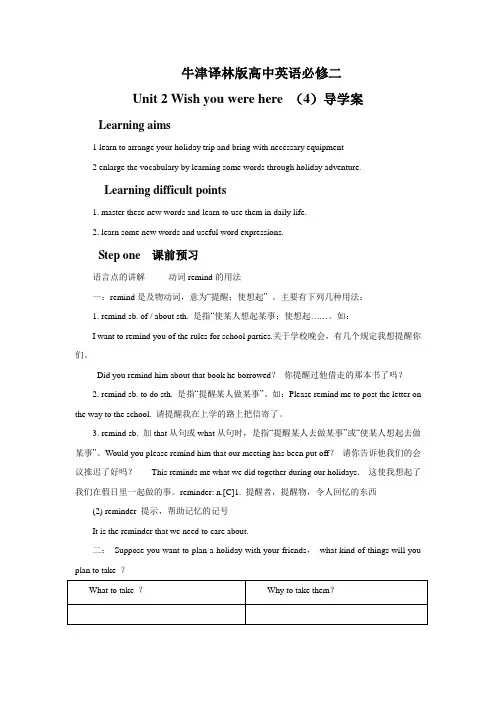
牛津译林版高中英语必修二
Unit 2 Wish you were here (4)导学案
Learning aims
1 learn to arrange your holiday trip and bring with necessary equipment
2 enlarge the vocabulary by learning some words through holiday adventure.
Learning difficult points
1. master these new words and learn to use them in daily life.
2. learn some new words and useful word expressions.
Step one 课前预习
语言点的讲解--------动词remind的用法
一:remind是及物动词,意为“提醒;使想起” 。主要有下列几种用法:
1. remind sb. of / about sth. 是指“使某人想起某事;使想起……。如:
I want to remind you of the rules for school parties.关于学校晚会,有几个规定我想提醒你们。
Did you remind him about that book he borrowed? 你提醒过他借走的那本书了吗?
2. remind sb. to do sth. 是指“提醒某人做某事”。如:Please remind me to post the letter on
the way to the school. 请提醒我在上学的路上把信寄了。
3. remind sb. 加that从句或what从句时,是指“提醒某人去做某事”或“使某人想起去做某事”。Would you please remind him that our meeting has been put off? 请你告诉他我们的会议推迟了好吗? This reminds me what we did together during our holidays. 这使我想起了我们在假日里一起做的事。reminder: n.[C]1. 提醒者,提醒物,令人回忆的东西
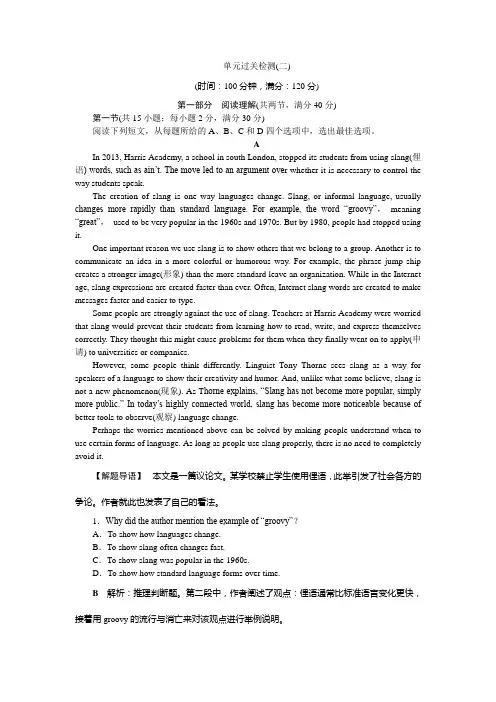
单元过关检测(二)
(时间:100分钟,满分:120分)
第一部分 阅读理解(共两节,满分40分)
第一节(共15小题;每小题2分,满分30分)
阅读下列短文,从每题所给的A、B、C和D四个选项中,选出最佳选项。
A
In 2013, Harris Academy, a school in south London, stopped its students from using slang(俚语) words, such as ain’t. The move led to an argument over whether it is necessary to control the
way students speak.
The creation of slang is one way languages change. Slang, or informal language, usually
changes more rapidly than standard language. For example, the word “groovy”, meaning
“great”, used to be very popular in the 1960s and 1970s. But by 1980, people had stopped using
it.
One important reason we use slang is to show others that we belong to a group. Another is to
communicate an idea in a more colorful or humorous way. For example, the phrase jump ship
creates a stronger image(形象) than the more standard leave an organization. While in the Internet
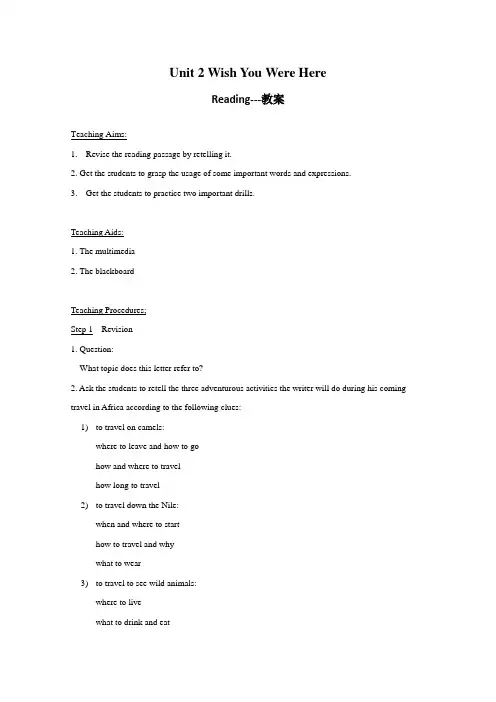
Unit 2 Wish You Were Here
Reading---教案
Teaching Aims:
1. Revise the reading passage by retelling it.
2. Get the students to grasp the usage of some important words and expressions.
3. Get the students to practice two important drills.
Teaching Aids:
1. The multimedia
2. The blackboard
Teaching Procedures;
Step 1 Revision
1. Question:
What topic does this letter refer to?
2. Ask the students to retell the three adventurous activities the writer will do during his coming
travel in Africa according to the following clues:
1) to travel on camels:
where to leave and how to go
how and where to travel
how long to travel
2) to travel down the Nile:
when and where to start
how to travel and why
what to wear
3) to travel to see wild animals:
where to live
what to drink and eat
what to buy and why
how to get close to wild animals
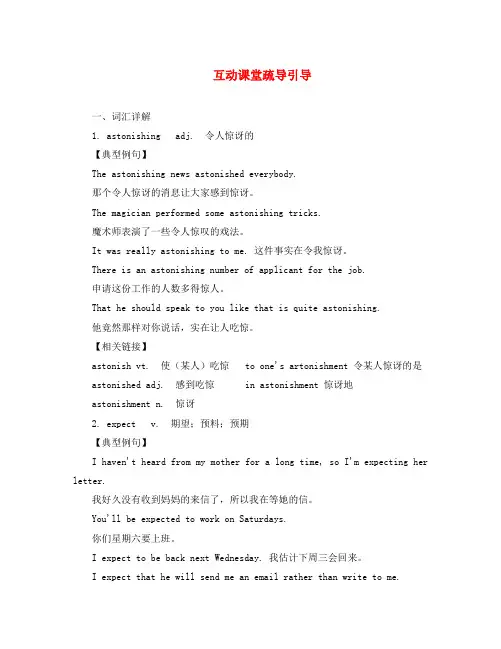
互动课堂疏导引导
一、词汇详解 1. astonishing adj. 令人惊讶的
【典型例句】
The astonishing news astonished everybody.
那个令人惊讶的消息让大家感到惊讶。
The magician performed some astonishing tricks.
魔术师表演了一些令人惊叹的戏法。
It was really astonishing to me. 这件事实在令我惊讶。
There is an astonishing number of applicant for the job.
申请这份工作的人数多得惊人。
That he should speak to you like that is quite astonishing.
他竟然那样对你说话,实在让人吃惊。
【相关链接】
astonish vt. 使(某人)吃惊 to one's artonishment 令某人惊讶的是
astonished adj. 感到吃惊 in astonishment 惊讶地
astonishment n. 惊讶 2. expect v. 期望;预料;预期
【典型例句】
I haven't heard from my mother for a long time, so I'm expecting her
letter.
我好久没有收到妈妈的来信了,所以我在等她的信。
You'll be expected to work on Saturdays.
你们星期六要上班。
I expect to be back next Wednesday. 我估计下周三会回来。
I expect that he will send me an email rather than write to me. 我希望他给我发个邮件而不是给我写信。
【知识小结】
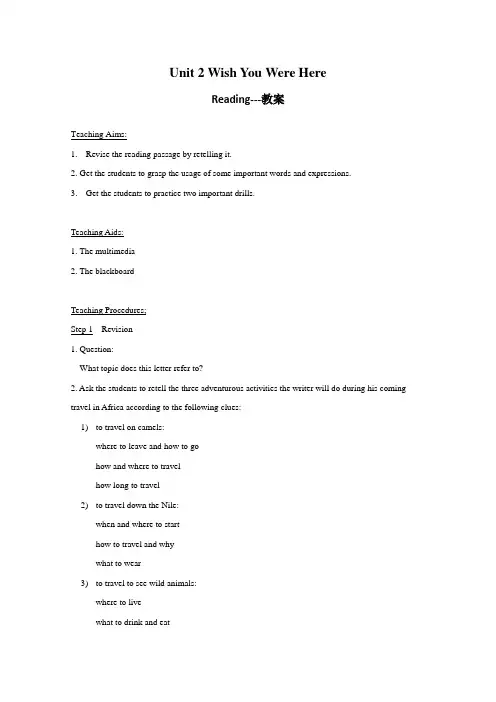
Unit 2 Wish You Were Here
Reading---教案
Teaching Aims:
1. Revise the reading passage by retelling it.
2. Get the students to grasp the usage of some important words and expressions.
3. Get the students to practice two important drills.
Teaching Aids:
1. The multimedia
2. The blackboard
Teaching Procedures;
Step 1 Revision
1. Question:
What topic does this letter refer to?
2. Ask the students to retell the three adventurous activities the writer will do during his coming
travel in Africa according to the following clues:
1) to travel on camels:
where to leave and how to go
how and where to travel
how long to travel
2) to travel down the Nile:
when and where to start
how to travel and why
what to wear
3) to travel to see wild animals:
where to live
what to drink and eat what to buy and why
how to get close to wild animals
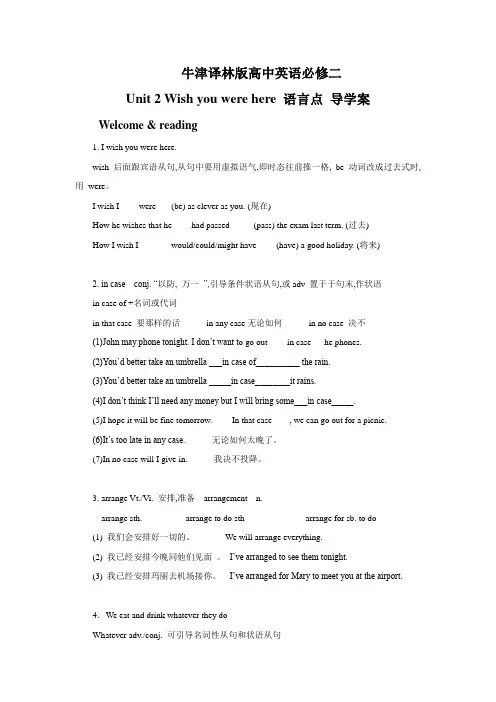
牛津译林版高中英语必修二
Unit 2 Wish you were here 语言点 导学案
Welcome & reading
1. I wish you were here.
wish 后面跟宾语从句,从句中要用虚拟语气,即时态往前推一格, be动词改成过去式时,用 were。
I wish I ____were___ (be) as clever as you. (现在)
How he wishes that he ____had passed_____ (pass) the exam last term. (过去)
How I wish I _______would/could/might have____ (have) a good holiday. (将来)
2. in case conj. “以防, 万一 ”,引导条件状语从句,或adv 置于于句末,作状语
in case of +名词或代词
in that case 要那样的话 in any case无论如何 in no case 决不
(1)John may phone tonight. I don’t want to go out ____in case___he phones.
(2)You’d better take an umbrella ___in case of__________ the rain.
(3)You’d better take an umbrella _____in case________it rains.
(4)I don’t think I’ll need any money but I will bring some___in case_____.
(5)I hope it will be fine tomorrow. ____In that case____, we can go out for a picnic.
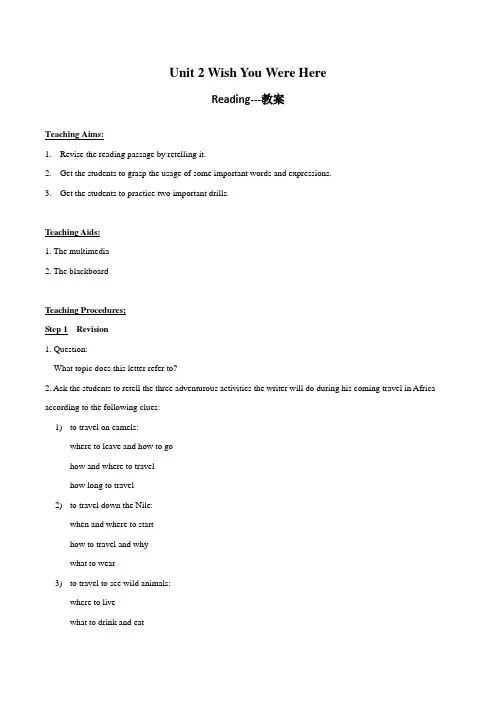
Unit 2 Wish You Were Here
Reading---教案
Teaching Aims:
1. Revise the reading passage by retelling it.
2. Get the students to grasp the usage of some important words and expressions.
3. Get the students to practice two important drills.
Teaching Aids:
1. The multimedia
2. The blackboard
Teaching Procedures;
Step 1 Revision
1. Question:
What topic does this letter refer to?
2. Ask the students to retell the three adventurous activities the writer will do during his coming travel in Africa
according to the following clues:
1) to travel on camels:
where to leave and how to go
how and where to travel
how long to travel
2) to travel down the Nile:
when and where to start
how to travel and why
what to wear
3) to travel to see wild animals:
where to live
what to drink and eat
what to buy and why
how to get close to wild animals
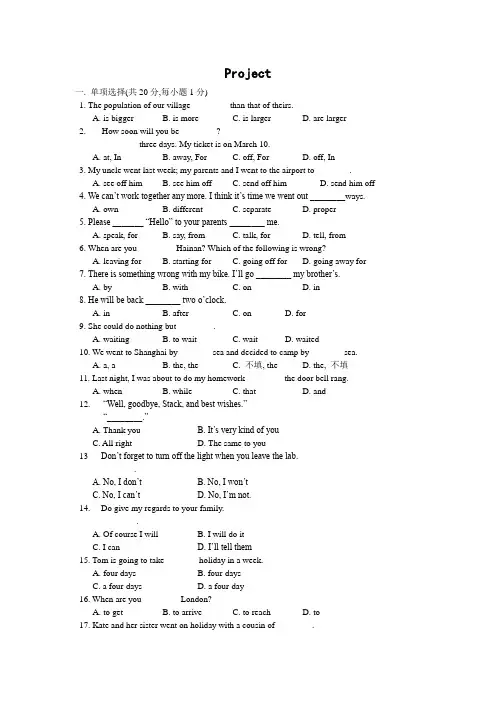
Project
一. 单项选择(共20分,每小题1分)
1. The population of our village ________ than that of theirs.
A. is bigger B. is more C. is larger D. are larger
2. ---- How soon will you be ________?
---- ________ three days. My ticket is on March 10.
A. at, In B. away, For C. off, For D. off, In
3. My uncle went last week; my parents and I went to the airport to________.
A. see off him B. see him off C. send off him D. send him off
4. We can’t work together any more. I think it’s time we went out ________ways.
A. own B. different C. separate D. proper
5. Please _______ “Hello” to your parents ________ me.
A. speak, for B. say, from C. talk, for D. tell, from
6. When are you ________ Hainan? Which of the following is wrong?
A. leaving for B. starting for C. going off for D. going away for
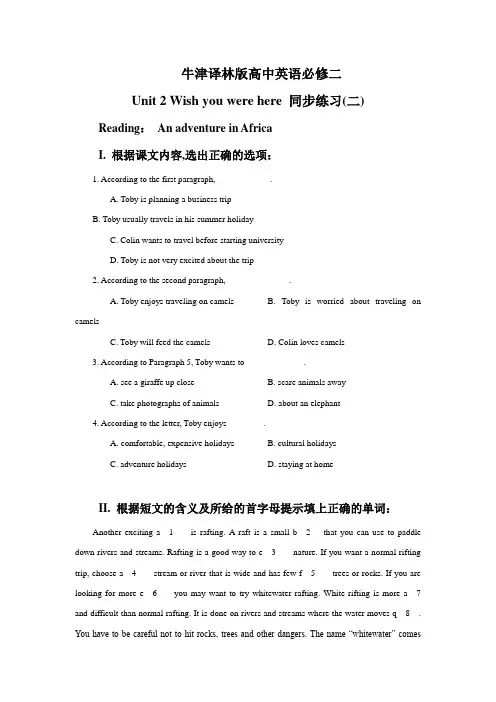
牛津译林版高中英语必修二
Unit 2 Wish you were here 同步练习(二)
Reading: An adventure in Africa
I. 根据课文内容,选出正确的选项:
1. According to the first paragraph, ____________.
A. Toby is planning a business trip
B. Toby usually travels in his summer holiday
C. Colin wants to travel before starting university
D. Toby is not very excited about the trip
2. According to the second paragraph, ______________.
A. Toby enjoys traveling on camels B. Toby is worried about traveling on
camels
C. Toby will feed the camels D. Colin loves camels
3. According to Paragraph 5, Toby wants to _____________.
A. see a giraffe up close B. scare animals away
C. take photographs of animals D. about an elephant
4. According to the letter, Toby enjoys ________.
A. comfortable, expensive holidays B. cultural holidays
C. adventure holidays D. staying at home
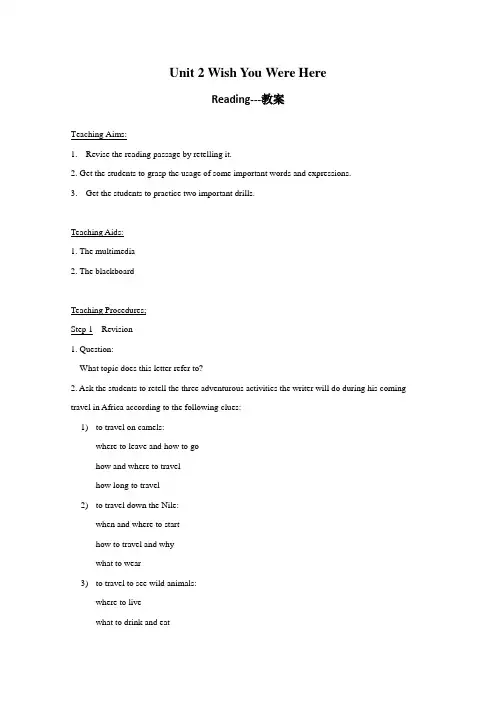
Unit 2 Wish You Were Here
Reading---教案
Teaching Aims:
1. Revise the reading passage by retelling it.
2. Get the students to grasp the usage of some important words and expressions.
3. Get the students to practice two important drills.
Teaching Aids:
1. The multimedia
2. The blackboard
Teaching Procedures;
Step 1 Revision
1. Question:
What topic does this letter refer to?
2. Ask the students to retell the three adventurous activities the writer will do during his coming
travel in Africa according to the following clues:
1) to travel on camels:
where to leave and how to go
how and where to travel
how long to travel
2) to travel down the Nile:
when and where to start
how to travel and why
what to wear
3) to travel to see wild animals:
where to live
what to drink and eat
what to buy and why
how to get close to wild animals
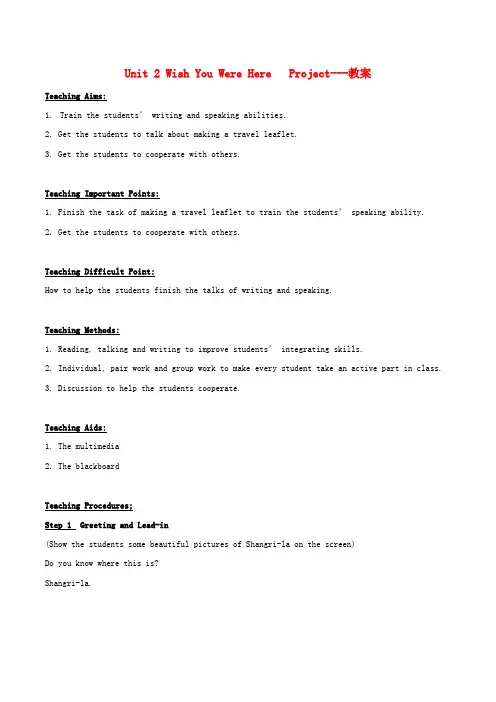
Unit 2 Wish You Were Here Project---教案
Teaching Aims:
1. Train the students’ writing and speaking abilities.
2. Get the students to talk about making a travel leaflet.
3. Get the students to cooperate with others.
Teaching Important Points:
1. Finish the task of making a travel leaflet to train the students’ speaking ability.
2. Get the students to cooperate with others.
Teaching Difficult Point:
How to help the students finish the talks of writing and speaking.
Teaching Methods:
1. Reading, talking and writing to improve students’ integrating skills.
2. Individual, pair work and group work to make every student take an active part in class.
3. Discussion to help the students cooperate.
Teaching Aids:
1. The multimedia
2. The blackboard
Teaching Procedures;
Step 1 Greeting and Lead-in
(Show the students some beautiful pictures of Shangri-la on the screen)
第1页 共16页
Unit 2 Wish you were here
Ⅰ.写作单词——会拼写
1.supply n.& vt. 提供,供给,补给
2.schedule n.& vt. 计划
3.view vt. 观看;看待
n. 景色;观点
4.spot n. 地点,场所
5.bury vt. 埋葬;埋藏
6.desert n. 沙漠
vt. 抛弃;舍弃
7.explore vt.& vi. 探索;勘探
8.wander vi.& vt. 漫游;漂泊;徘徊
Ⅱ.拓展单词——能辨别
1.reflect vt. 反射,反映
→reflection n. 反映,反射
2.defend v. 防御;保卫
→defence n. 防御;保护
3.scare vt. 使恐惧,惊吓
→scaring/scary adj. 使人惊恐的,吓人的,可怕的
→scared adj. 惊慌的,吓坏的
4.advance n. 前进;预先
vi. 前进;进步
第2页 共16页 →advanced adj. 先进的,高级的
5.announce vt. 宣布,宣称
→announcement n. 通告,宣布,声明
6.surround vt. 包围
→surrounding adj. 周围的,附近的
7.arrange vt.& vi. 安排
→arranger n. 乐曲改编者;安排者
→arrangement n. 安排,布置
8.ordinary adj. 普通的;平常的
→extraordinary adj. 不同寻常的
9.comfort n. 舒服
→comfortable adj. 舒服的
→uncomfortable adj. 不舒服的,不自在的
10.protect vt.& vi. 保护
→protection n. 保护
11.officer n. 官员
Unit 2
Wish you were here
[单词 拼写应用]
核心单词
1.supply n.& vt.提供,供给,补给
2.schedule n.& vt.计划
3.view vt.观看;看待 n.景色;观点
4.spot n.地点,场所
5.bury vt.埋葬;埋藏
6.desert n.沙漠 vt.抛弃;舍弃
7.protection n.保护
8.wander vi.& vt.漫游;漂泊;徘徊
9.publish vt.出版;发表
[语境运用] 用所给词的适当形式填空
1.(2018·全国卷Ⅱ)China's approach to
protecting(protect) its environment while
feeding its citizens “offers useful lessons for agriculture and food policymakers
worldwide”.
2.(2018·全国卷Ⅰ)Two of the authors of the review also made a study
published(publish)
in 2014 that showed a mere five to ten minutes a day of running reduced the risk
of heart disease.
3.The project is aimed to make some companies reuse all deserted (desert) plastic
bottles.
4.Their ambitions were finally dead and buried(bury).
5.Finally,they chose some places in the park that were the best for
Unit 2 Wish you were here
脱口而出
A road of a thousand miles begins with one step.
千里之行始于足下。
All work and no play makes Jack a dull boy. 只工作,不玩耍,聪明孩子要变傻。
A single flower does not make a spring. 一花独放不是春。
趣味背景
Tanzania Safaris(狩猎旅行)
An essential destination on Tanzania safaris
is Serengeti National Park, the country's
largest and most famous reserve. With 5,700
square miles of plains stretching as far as the
eye can see, the Serengeti is home to one of
the most diverse wild animal populations on
Earth. It is also one of the best places on the
continent to view lion prides. Safari guests traverse the Serengeti in four-wheel-drive
vehicles to spot buffaloes, cheetahs, leopards,
rhinos and more. For breathtaking sights of the
game as they stir at dawn, some tour operators
provide the option of an early morning hot-air
高中英语讲义
只要坚持 梦想早晚会实现 1
一、语基必备知识
(一)重点词汇——分类记忆
Ⅰ.阅读词汇——知其意
1.desert n.
沙漠
vt. 抛弃,舍弃
2.rough adj. 汹涌的;粗糙的;大概的
3.altogether adv. 总共
4.atmosphere n. 空气;大气层
5.destination n. 目的地
6.publish vt. 出版;发表
7.adventure n. 冒险;冒险经历
8.extraordinary adj. 不同寻常的
9.afterwards adv. 后来,然后
10.wander vi.&vt. 漫游,游荡;徘徊;漂泊
Ⅱ.核心词汇——写其形
1.advance n. 前进;预先
vi. 前进;进步
2.supply n.&vt. 提供,供给,补给
3.tourism n. 旅游业
4.schedule n.&vt. 计划
5.view vt. 观看;看待
n. 景色;观点
6.beauty n. 美;美好的人或物
7.spot n. 地点,场所
8.harmony n. 和谐,协调,融洽
9.bury vt. 埋葬;埋藏
Ⅲ.拓展词汇——通其变
1.reflect vt.反射(声、光、热等);反映→reflection n.反映,反射
2.arrange vt.&vi.安排→arrangement n.安排,布置
3.defence n.防御;保护→defend v.保护,保卫
4.tiring adj.让人疲劳的,累人的→tire v.使……疲劳→tired adj.(人)疲劳的;困倦的→tiredness n.疲劳,疲倦
5.scare vt.使恐惧,惊吓→scary adj.使人惊恐的,吓人的,可怕的→scared adj.惊慌的,吓坏的
6.explore vt.& vi.探索;勘探→exploration n.探险→explorer n.探险者
Module_2_Unit_2_Wish_you_were_here_基本知识点
Module 2 Unit 2 Wish you were here 基本知识点
教学⽬标:1. 掌握本单元的基本词汇,包括中英⽂和词性的转换,能在阅读中读懂⽂章。
2. 掌握基本短语,包括介词短语,动词短语,常⽤词的固定搭配。
3. 掌握基本句型,并根据所学句型能够翻译句⼦。
4. 掌握常见的动词时态和语态的基本⽤法,搞清楚⼀些时态的区别,记住⼀些在特定时态语态中使⽤的常见词或表达,并能够做⼀些基本练习。adventure 冒险,冒险经历astonishing 令⼈惊讶的camel 骆驼
dusty 尘⼟飞扬的,满是灰尘的
local 当地的,地⽅的
camp 宿营,宿营地
torch ⼿电筒,⽕把,⽕炬dark ⿊暗
in the dark 在⿊暗中uncomfortable 不舒服的,不⾃在的
actually 实际上,事实上white-water rafting ⽩浪漂流,激浪漂流
clothing ⾐服,服装
helmet 头盔
life jacket 救⽣⾐
in case万⼀
raft 筏⼦,乘筏⼦漂流upside down 颠倒,上下翻转过来
whatever ⽆论什么,⽆论何事including 包括
backpack 背包
supply供给,补给,提供,giraffe 长颈⿅
gun 枪,炮
scare 使恐惧,恐吓up close 靠近地
tiring 让⼈疲劳的累⼈的
sick 感到恶⼼的,患病的sunset ⽇落,晚霞
African ⾮洲的,⾮洲⼈
bite 咬
envy 羡慕,嫉妒
view 景⾊,风景
forward 向前,向着将来
look forward to 期盼,盼望note 便条,短信
interview 采访,访问schedule ⽇程表,时间表sunrise ⽇出,朝霞
dawn 黎明,拂晓surprisingly 令⼈惊讶地,意外地total 完全的,全然的,全部的,总计的